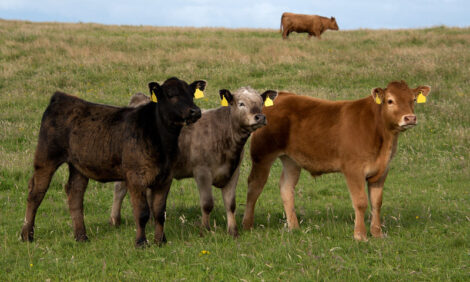



Beef Production Strategies During Drought
As the weeks continue to pass without any significant rain in the Midwest, it is getting increasingly difficult to find feed for livestock, said University of Illinois assistant professor of animal sciences Dan Shike.“It’s amazing that the poor pasture conditions got almost no media attention,“ he said. “They were in very poor condition even before the corn crop was, but it just doesn’t grab the headlines as much.”
Cattle producers are facing some serious challenges. “They’re out of grass and out of forage. Other feeds that they might try to buy are in short supply and very expensive,” Mr Shike explained. Feed prices are at historic highs, as are many of the grain supplements.
Even ethanol coproducts, such as distillers’ grains and corn gluten feed, are becoming more expensive.
Livestock producers are wondering if they can use the drought-stricken corn as feed. Mr Shike says that this is possible if nitrate levels are within acceptable limits. Nitrate levels depend on a number of factors, such as how much fertilizer was applied and at what stage the drought affected the plant. “It is absolutely necessary to test for nitrate,” Mr Shike warned.
This year, plants that got rain early in the season seem to have had more nitrogen uptake than plants that were under drought conditions for most of the growing period. “We are getting reports from corn producers that some of the corn that looks the toughest is actually acceptable for nitrate level,” he said.
Even if damaged corn can be used for forage, it will not fill the hole in the livestock food supply. Many producers are tapping into the feed stores that they had saved for winter feeding. The availability of coproducts is limited at the moment because some ethanol plants have shut down or are considering doing so. Some of them are not contracting new coproducts until they actually start harvesting the next corn crop.
“It’s just a time of real uncertainty,” Mr Shike said.
Producers are going to have to make some tough management decisions. “We’re encouraging producers who still have calves on cows to consider weaning them early,” said Mr Shike. “If you wean the calf, you immediately reduce that requirement on the cow, and if you then take the calves out of the pasture, you take that grazing pressure off.” Feeding the calf is usually less expensive than feeding the cow to feed the calf.
Producers have not reached the point where they have to make decisions about culling, which would normally be in the fall. Mr Shike notes that the US beef herd has been dwindling and that many cows were lost to the 2011 drought in the Southwest, bringing beef prices up to historic highs. Extensive culling would make the situation worse.
Mr Shike said that the effects of the drought are likely to be felt for a long time. He suggested some short-term coping strategies but noted that each producer needs to assess his own situation.
“Look at what feeds you have stored and make the plan,” he said. “Consider weaning the calves, consider culling. If you wean early, you can cull sooner than the rest of the crowd. If you sell those culled cows before everybody else does, you might get a better price.”
He also suggested using low-quality forage for the moment because cows have the lowest nutrient requirements when the calves are weaned and they are still in the early stages of gestation.
“Once we transition into winter, the cattle are under more strain because of the colder temperatures and the fact that they are in a later gestation stage. Their nutrient requirements are going to go up,” Mr Shike explained. “You should save any high-quality forage you have for then and supplement it with coproducts.”
August 2012


